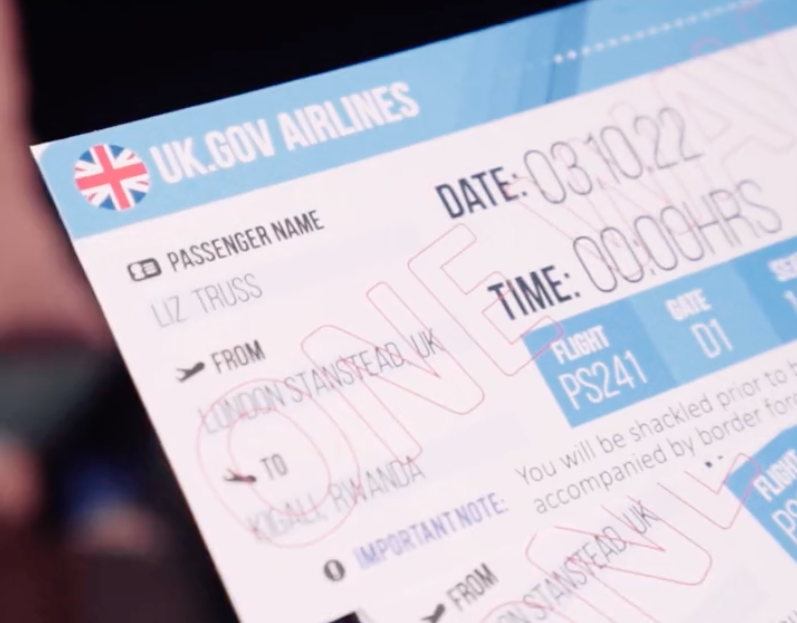Article 23 of the Universal Declaration of Human Rights recognises that the right to work is a fundamental right, but under UK law people seeking asylum are not allowed to work. With growing public support, the charity Refugee Action asked the Treasury an important question: would it accept £300m a year in exchange for lifting the ban? That’s how much the treasury could profit from allowing people seeking asylum the right to work.
To coincide with Jeremy Hunt’s announcement of the autumn statement, campaigners from Refugee Action presented the treasury with a cheque of £300m for the next year. The sum represents the money that the treasury would make if the government lifts the ban on allowing people seeking asylum to work.
The Lift The Ban campaign has attracted attention in recent weeks as people seeking asylum have shared their struggles to live on £8.44 a week.
Giving people seeking asylum the right to work is worth £300 million a year to the Treasury.
So today we're asking: Jeremy Hunt, do you want this cheque?#LiftTheBan #AutumnStatement pic.twitter.com/K9tFeO2yMU
— Refugee Action 🧡 (@RefugeeAction) November 17, 2022
Outside the Treasury, Refugee Action said: “Jeremy Hunt, do you want this cheque? Budget day comes with talk of tough decisions so how about an easy one? Lifting the ban and giving people seeking asylum the right to work is worth £300m to the economy and new tax.”
The cheque was walked around the Treasury and was registered to the ‘Bank of Common Sense’. Its figure is based on national insurance and income tax contributions if half of the 69,593 working-age people waiting more than six months for a decision on their asylum claim found work.
Once able to support themselves, people seeking asylum would no longer need asylum support payments from the government. Refugee Action says this would be worth a grand total of £308,472,107.
Refugee Action said: “A builder, a chef, an office worker, a scientist, a farmer, a care worker and a teacher want to work. It sounds like the set up for a punchline, but it’s the Home Office rules that freeze them out because they’re seeking asylum that is a joke.”
According to the Refugee Council, the total cost of a training a refugee doctor to work in the NHS is just 12% that of training a new doctor for one year.
There are approximately 1,200 medically qualified refugees recorded on the British Medical Association’s database. It is estimated to cost around £25,000 to support a refugee doctor to practise in the UK. Training a new doctor is estimated to cost between £200,000 and £250,000.
Support from the public
In March 2022, YouGov polling found that 81% of the public support the right to work for people seeking asylum in the UK.
Refugee Action said: “It’s not just nonsensical, the ban is harmful to everyone involved. It takes the toughest toll on people seeking asylum, but the UK economy also misses out on tax revenue and much-needed specialists by leaving people frozen in poverty. The time has come to #LiftTheBan.”
For example, Semira, a refugee from Eritrea, was in good health, and had no children. Because of that, she wasn’t classed as “priority need” and as a result was not offered accommodation by her local authority. Semira was told she would need to survive alone on the streets of London for six months before she would qualify for any kind of housing.
After living on £5.39 a day, and being banned from working while her claim was being processed, there was no way Semira could save the money for a deposit.
After sleeping at a train station in London, Semira contacted the Refugee Council, who were able to help. She now has somewhere of her own to call home. She said: “When I realise that I’m in my bed, somewhere I can cook some food, that happiness… there are not enough words to explain. I feel so happy.”
Semira is learning English and is applying for jobs so she can build a brighter future, and has received refugee status from the Home Office. However, if the ban was lifted, people like her may not have to experience homelessness or the hardship she lived through.
A step forward for the economy
Lord Bethell, former minister for innovation at the Department of Health and Social Care during the pandemic, stated:
“At a time when the prime minister and the chancellor are mulling plans to raise more from tax and reduce spending, giving people seeking asylum the right to work is a policy that would satisfy both aims. Lifting the ban on work would also signal to business that the government is serious about tackling a serious threat facing many companies up and down the UK – record staff shortages.”
Recent ONS labour market figures revealed the news that unemployment continues to be at a 50-year low. But they also showed the number of job vacancies remains above 1.2 million. This means the UK still has the tightest labour market on record, which will stifle a push for a strong, sustainable economy and growth.
Christina McAnea, general secretary for Unison, said: “Unison is proud to be part of the lift the ban coalition. The right to decent work goes to the heart of what unions campaign for. Public sector workers tell us how distressing it is to see the consequences of these inhumane policies upon asylum seekers. Whether it involved a nurse or a social worker, a housing officer or a teaching assistant – Unison is there to offer care and compassion for those who need help.”
Refugee Action said: “The cheque is written, we just need the government to cash it.”





